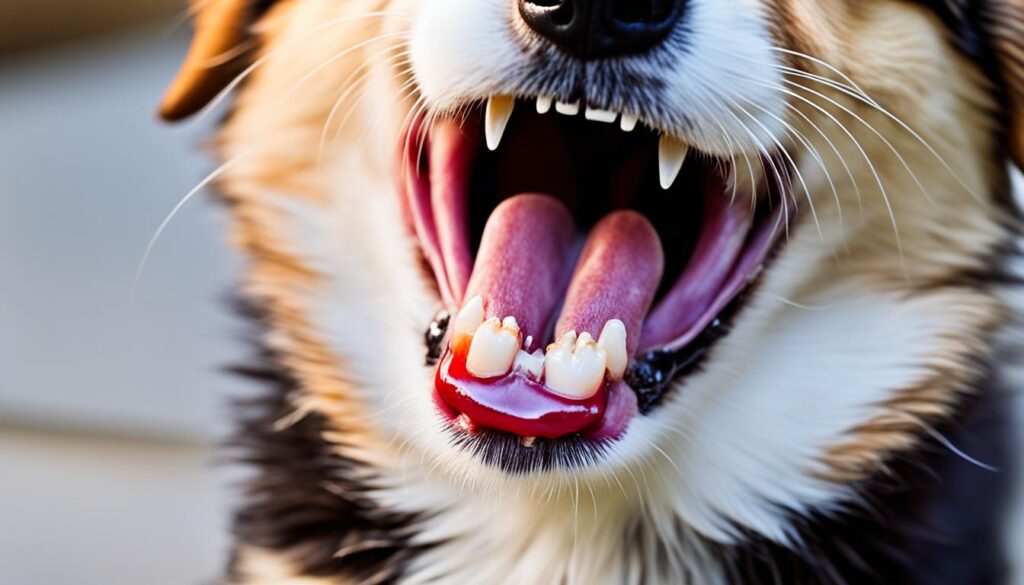Puppy Not Eating? Causes And Solutions
Published August 10, 2024 Articles

Did you know over 25% of puppy owners see their pets not eating at some point in the first year? If your puppy not eating worries you, you’re not alone. It’s important to address a puppy’s loss of appetite to keep them healthy. This guide will cover the main reasons behind puppy anorexia and how to help your puppy eat well again.
Key Takeaways
- Understand the potential causes of puppy not eating, including health issues, dental problems, and environmental factors.
- Learn how to recognize the signs of puppy malnutrition and take swift action to address the issue.
- Discover effective strategies to stimulate your puppy’s appetite and encourage healthy eating.
- Explore ways to create a feeding environment that caters to your puppy’s needs and preferences.
- Seek veterinary guidance if your puppy’s lack of appetite persists or worsens.
Understanding Puppy Appetite Loss
When your puppy stops eating, it can be worrying. Puppy appetite loss, or anorexia, can stem from health or behavior issues. Knowing the reasons behind your pup’s lack of appetite helps in addressing the problem.
Potential Causes of Anorexia in Puppies
- Dental problems, such as teething or mouth sores, can make eating painful for your puppy.
- Stress and anxiety, often from a new environment or being separated from their litter, can suppress a puppy’s desire to eat.
Recognizing Signs of Puppy Malnutrition
If your puppy’s lack of appetite continues, look for signs of malnutrition. These include:
- Weight loss or failure to gain weight
- Dull, dry coat
- Lethargy and decreased activity levels
- Dehydration, indicated by loss of skin elasticity and dry mucous membranes
- Weakened immune system, leading to frequent illnesses
It’s important to find and fix the cause of your puppy’s appetite loss. This ensures they get the nutrition they need for healthy growth. If your pup’s lack of appetite doesn’t improve or is serious, see your vet for help.
https://www.youtube.com/watch?v=zuRNKjRZmto
Puppy not eating: Common Health Concerns
If your puppy won’t eat, call your Veterinarian.
Dental Issues and Mouth Discomfort
Dental problems like teething, gum inflammation, or tooth infections can hurt your puppy’s mouth. Puppies often feel pain during teething, which can last until they are about 6 months old. If your puppy won’t eat, check their mouth for signs of dental issues, such as redness, swelling, or abnormal growths.
- Teething and gum inflammation
- Tooth infections or decay
- Oral injuries or abnormal growths
If you think your puppy has dental or mouth pain, see your vet. They can check your puppy’s mouth, figure out the problem, and give the right treatment. This will help ease the pain and make your puppy want to eat again.

“Addressing the underlying cause of your puppy’s lack of appetite is crucial to their overall health and well-being.”
By spotting and fixing health issues that make your puppy not want to eat, you can make sure they get the care and nutrition they need to be healthy.
Environmental and Behavioral Factors
When your puppy stops eating, it might not just be about their health. Things like their environment and behavior can also play a big role in a puppy’s loss of appetite. Knowing what affects them can help you get them eating well again.
Changes in routine or environment can really affect a puppy’s eating habits. Moving, getting a new family member, or even changing the layout of your home can stress them out. This stress often makes them not interested in food, leading to a puppy hunger strike.
Some puppies are just picky eaters. They might not like certain flavors or textures. This makes feeding time hard, with them refusing treats and not wanting their usual food.
- Create a calm, consistent mealtime routine to ease environmental stress
- Gradually introduce new foods to expand your puppy’s palate
- Offer a variety of healthy, tasty options to cater to their preferences
By looking at both physical and behavioral factors, you can help your puppy enjoy meals again. This keeps them with a healthy canine appetite.
Conclusion
There are many reasons why a puppy might not want to eat, like health issues or behavioral problems. It’s important to watch how much your puppy eats and act fast if you see any big changes.
To help your puppy eat well, try these tips:
- Give your puppy a high-quality, nutritious diet that fits their needs.
- Feed them small meals often to help them eat regularly.
- Make sure they always have clean, fresh water.
- Slowly introduce new foods to prevent stomach problems.
- Don’t give them human food, as it can mess with their eating and digestion.
If your puppy doesn’t eat for more than a day or two, or if they lose weight or seem tired, see a vet. They can find out why and help your puppy get better.
Knowing why puppies don’t eat and acting early can keep your pet happy, healthy, and ready to eat their food.

Stress from Adoption Day
Bringing a new puppy home is a big step, filled with joy and change. It can be tough for both you and your new pet. The new sights, sounds, and smells can make your puppy not want to eat.
When your puppy starts their new life, they might feel too much stress. This stress can show in many ways, like not eating, sleeping differently, feeling anxious, or having tummy troubles. It’s important to notice and deal with these issues to help your puppy adjust and keep their appetite healthy.
To make your new puppy feel better, try making a quiet spot for them to relax. Introduce them to new people and things slowly, letting them get used to it. A steady routine, familiar toys, and lots of love can make them feel safe and happy in their new home.
FAQ
What are some common reasons why my puppy is not eating?
How can I recognize the signs of malnutrition in my puppy?
What health concerns can lead to a puppy’s lack of appetite?
How can environmental and behavioral factors impact my puppy’s appetite?
What should I do if my new puppy isn’t eating due to the stress of adoption?
(Article Last Updated on August 11, 2024)
